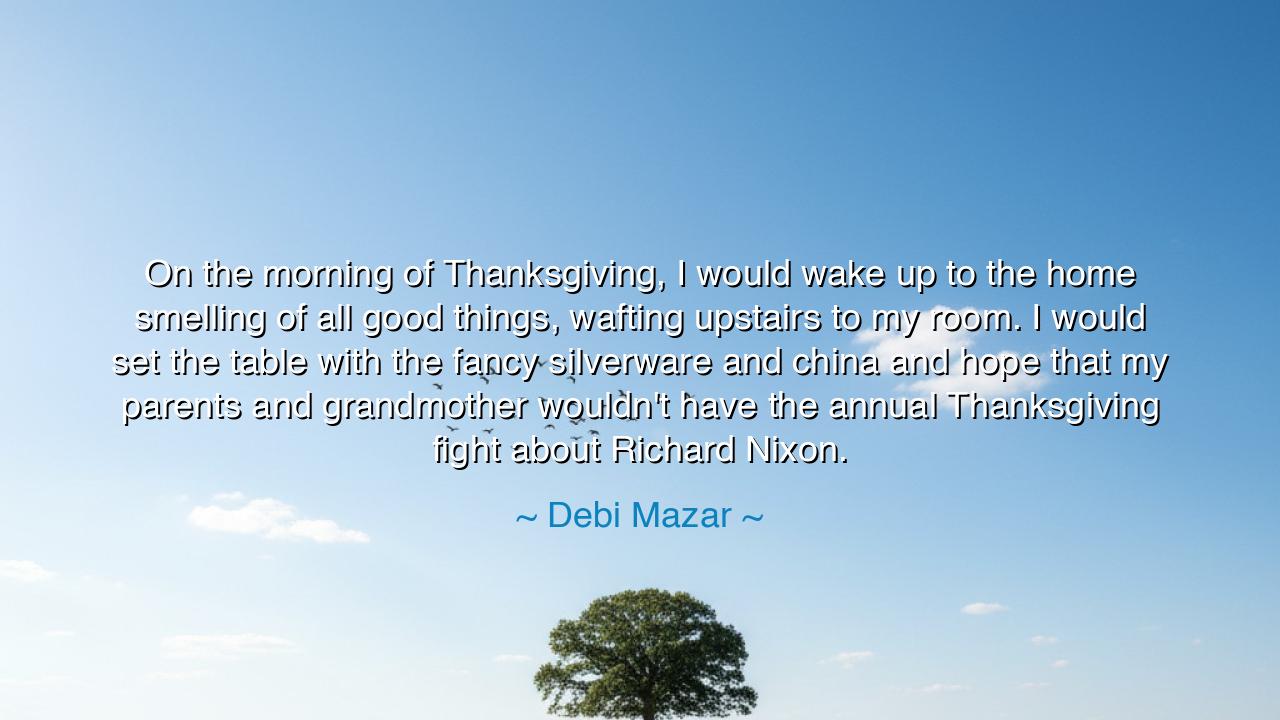
On the morning of Thanksgiving, I would wake up to the home
On the morning of Thanksgiving, I would wake up to the home smelling of all good things, wafting upstairs to my room. I would set the table with the fancy silverware and china and hope that my parents and grandmother wouldn't have the annual Thanksgiving fight about Richard Nixon.






The words of Debi Mazar — “On the morning of Thanksgiving, I would wake up to the home smelling of all good things, wafting upstairs to my room. I would set the table with the fancy silverware and china and hope that my parents and grandmother wouldn't have the annual Thanksgiving fight about Richard Nixon.” — speak to more than memory. They are the echo of a thousand homes, where love and conflict, ritual and imperfection, dwell together beneath one roof. In her remembrance, there is the scent of roasted gratitude mingled with the smoke of human frailty. It is a confession of the duality of family life — that within the sanctuary of celebration, discord may yet find a seat at the table.
In the ancient days, the wise would say: “The hearth is where the gods test our patience.” For it is not in temples or courts but around the family table that the soul learns compassion, forgiveness, and endurance. The quote recalls this truth. Even amid warmth and laughter, differences rise — political, personal, generational. The fight about Richard Nixon is not merely about a man or his deeds; it is the symbol of how ideologies can fracture love if hearts do not rise above pride. The child who sets the silverware with trembling hope embodies the spirit of peace, the quiet warrior who prepares a feast of reconciliation in a land of division.
Think of Socrates, who in the market of Athens spoke calmly even as the young and old hurled insults. He understood that discord was the whetstone of wisdom. So too does Mazar’s memory teach: that even the quarrels of kin are sacred opportunities for the soul to grow. When a child witnesses love strained yet enduring, they learn the deep truth — that affection does not mean agreement, and that unity is not sameness but the ability to remain at the table, despite the storm.
There is also nostalgia’s tender ache woven into these words. The scents of Thanksgiving — roasted turkey, baked bread, cinnamon — become vessels of memory. They remind us that time passes, that those who once fought or laughed with us will one day be gone. Thus, what seemed painful in youth becomes holy in recollection. The annual argument, once dreaded, is later remembered with fondness, for it was part of the living tapestry of family — imperfect, human, real.
In history, we see this mirrored in the American Civil War, where brothers stood on opposite sides, divided by conviction but still bound by blood. Many letters from that time tell of soldiers who, even in battle, prayed for their kin across the line. Such is the essence of Mazar’s Thanksgiving scene — a conflict not of enemies, but of loved ones too passionate to be silent, too bound by love to separate entirely. The table becomes the battlefield of the heart, and the peacekeeper — the child, the dreamer — becomes the unseen saint who holds the family together.
Let us take from this a lesson for our own days. When you gather with those who differ from you, remember that the home is a temple of mercy, not a court of judgment. Set the table with patience as with silver, polish your words as you would your grandmother’s china, and let your hope — not your pride — preside over the meal. To preserve love, one must sometimes listen more than speak, and forgive faster than one remembers.
So, when next you sit at your own Thanksgiving table, or any feast of union, be the one who breathes peace into the air. Let the aroma of good things rise above the smoke of disagreement. And if arguments come — as they will — smile softly, remembering that even those disputes are threads in the tapestry of belonging. For a family that can quarrel and still share bread is a family that has not yet forgotten how to love.
Thus, Mazar’s words endure as a quiet hymn: that joy is not the absence of conflict, but the grace to remain kind within it. The wise heart does not flee from the noise of life but transforms it into music. Therefore, live so that every day — Thanksgiving or otherwise — your home may “smell of all good things,” not only in the kitchen, but in the spirit that dwells within.






AAdministratorAdministrator
Welcome, honored guests. Please leave a comment, we will respond soon